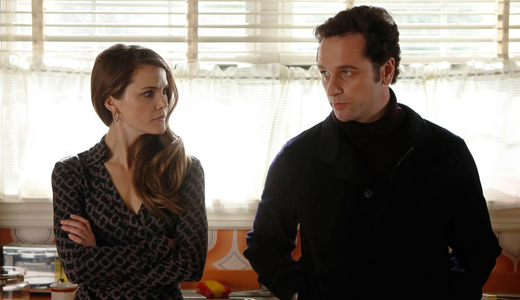
This is a review of the latest episode of FX’s hit drama The Americans. For the previous episode, click here.
Season 3, episode 8 – “Divestment”
Terrorist bombings are supposed to be scary; it’s in their description. In the history of the Soviet Union up through today, there have been very few incidents since revolutionary days.
The United States’ cases have almost completely been domestic in nature, such as with the Oklahoma City bombing, which was committed by white Christian separatists.
We’re lucky that nothing major has happened since then. It may be because we haven’t sent troops to occupy resentful countries in recent decades. Maybe we learned our lesson from Vietnam, that nothing good comes of sticking our noses in places without a compelling moral reason for doing so.
Than again, it could well be because the Soviet Union has played a powerful role in helping to deescalate conflicts in the Middle East, since the US is seen as compromised by its support of Israel.
Whatever the reason for our escaping attacks by foreign terrorists, you can see the “what-if” scenario almost played out in the current episode of The Americans, which is set in the early 1980s.
Philip and Elizabeth Jennings thwart the bombing of an American university, yet they’re unlikely to receive a medal for their actions. They’re Soviet operatives masquerading as travel agents.
The instigator of the foreign plot was a South African spy named Venter, who’d convinced a fellow countryman to prepare a bomb to plant at a public event at a university.
This was a time when activists around the world were pushing for corporations to divest themselves of any financial ties to South Africa, which was a hotbed of government-sanctioned racism as well as the torture of anti-government suspects.
In last week’s episode, the Jenningses, aided by black South African nationalist Reuben Ncgogo, captured Venter and his dupe, named Todd. Venter’s plan to assassinate Ncgogo (Dwayne Alistair Thomas) went awry due to our favorite spy couple’s deft kidnapping of Venter and Todd.
Now they’re interrogating the pair in the usual abandoned warehouse. Honestly, given the number of TV shows that rely on this setting, you’d think characters from the various shows would end up tripping over one another. They’re bound to run out of warehouses eventually.
Venter has something big up his sleeve, they know. The first tool employed is bribery of Venter, which they probably knew wasn’t going to work. They’re up against a powerful ideology combined with twisted patriotism, for Venter believes that anything-torture, planting bombs (as it turns out), hiding suspects in secret locations, suppression of voting rights-anything is justified to protect his white-ruled government.
Bribery doesn’t work, so Ncgogo and Philip (Matthew Rhys) apply their fists to Venter while Elizabeth tries persuasion on Todd, who claims he didn’t do anything. Something feels off to Elizabeth (Keri Russell), but she can’t get past the young man’s panicky defenses.
Finally, the two captives are placed facing one another in chairs a few yards apart in an abandoned warehouse. It’s a cold, bleak day. Young Hans, the white South African spy recruit, is keeping watch from above, while Elizabeth prepares herself to shoot Venter. There’s nothing else they can do. Venter won’t break-the pair was clearly up to something-and they can’t let him loose since he likely will kill other dissident South Africans the way he tried to do with Ncgogo.
Ncgogo, however, who’s seen the worst of what his country’s rulers have done to his people and to himself, tells Elizabeth to step aside. “You have your own country. You can never understand,” he says.
He pulls out a tire and jams it over Venter’s bound body. He drenches the man with gasoline and sets him ablaze.
It’s a gruesome death, one experienced in later years by a number of people during the lead-up to the dissolution of apartheid in South Africa. The scene is also an anachronism, since the first recorded deaths by “necklacing” didn’t happen until a year or two later.
However, for the purposes of the show, it makes for a showier, albeit difficult to take, death scene. Philip and Elizabeth avert their gazes from the horrific sight. We know that South Africa committed barbaric acts just as bad against such heroes of Steven Biko, but still, this is tough to watch.
A terrified Todd spills the truth, that Venter had him build a bomb that was supposed to go off during a board of trustees meeting at an American university. Because of the many protests at the time championing divestment, Venter (acting on his government’s behalf) thought that the bombing would destroy the movement and thus buy his country more time.
Todd says that he did build the bomb but it’s still in his dorm room. He claims he didn’t want to plant it, but it’s hard to believe that Venter wouldn’t have eventually convinced the dupe to do his bidding.
Later, a handcuffed Todd is in the back of a van waiting, along with Elizabeth, for Philip and Ncgogo to return, which they do, with the evidence in hand. There in a bag lies the evidence of a functioning bomb. Ncgogo advises killing the young man but this time Philip and Elizabeth have their way. They believe Todd won’t involve himself in any more terrorist schemes. They set him free and speed off.
Fictional lives saved by fictional foreign agents-and of course since we haven’t experienced a major terrorist attack by foreign elements, it may seem a bit abstruse, yet in the early ’80s world of the non-American Jennings, they’re acutely aware of the political struggles going on in other countries
And of one struggle in particular. Later in the show, Elizabeth asks Philip for the name of his eldest son, who she just learned about in the last episode. Misha is serving as a Russian paratrooper in Afghanistan.
It’s a deadly conflict, one in which the US, acting through the CIA, has paid for, trained, supplied and sanctioned terroristic acts against the government in Kabul as well as against those civilians who embraced such modern notions as women’s rights and education. Americans at home were for the most blissfully unaware of the tortures and abuses going on with the advice and consent of our government.
I’d like to think that if something like that happened today we’d be much more concerned, what with the Internet available to spread the truth.
The Internet was hardly nationwide back in the early ’80s, so Philip follows the war in Afghanistan by listening to BBC radio broadcasts.
Elizabeth knows that Philip is worried about his son so she meets with their spy handler Gabriel. But first he gives her another tape from Elizabeth’s mother, who’s still alive and still battling cancer.
Elizabeth asks Gabriel for a favor: can he see what can be done to bring Philip’s son home from Afghanistan? Gabriel promises to try.
The next oldest-and more available-child of the Jennings household is Paige, who we see visiting her local library to look through microfilm news accounts in search of the fabled Gregory, who her mother described as a civil rights martyr.
The first image she finds of Gregory, he’s in a civil rights march, but in the next he’s been arrested after a traffic stop for carrying drugs and a pistol.
When she shares this with her mother, Elizabeth explains that Gregory’s life was hard and complicated, but that he never stopped fighting.
“Was he a criminal?” Paige asks. Her mother tells the girl that “things aren’t that simple, and you know that. You’re already fighting against injustice. Who are you fighting against? Countries, governments, people who make laws.”
You can’t go robbing banks, Paige points out, to which her mother agrees.
Meanwhile, Nina, the disgraced double agent, has won a conditional freedom from prison in Russia in exchange for her having coaxed a confession out of a female spy.
Now she’s set up with a job at a scientific research facility that is run by the kindly mentor she’d betrayed back in Washington DC. He promises to be professional toward her, but also makes it clear that he can never forgive her.
She feels ashamed at what she did, but now she must use what her handler calls her ability to get inside people’s heads. Use it, to find out whether a particular scientist who’d been repatriated (due to Philip’s work) back to the USSR is actually putting forth honest effort.
Nina’s fall has been hard, but she’s determined to make her way back up
Now we turn to the tale of Martha (Alison Wright), who like her Biblical namesake has worked competently with little to show for it. She realizes that, with the discovery of the spy pen she’d planted in FBI agent-in-charge Gaad’s office, and the subsequent ongoing investigation, her husband, Clark, isn’t who he says he is.
She’s not ready to come clean about the husband who’s not an interagency spy after all. In fact, in this episode Martha turns out to be a good liar.
She holds up well during the slimy investigator’s questioning, helped by the fact that he’s not prepared to see a woman as a credible threat. [He goes on to impugn Agent Aderholt during their subsequent interview. It’s impossible not to see the racism in the way he attacks the humble beginnings of Aderholt, who is black.]
Martha survived the office politics but the real drama is at home when Clark/Philip arrives at their apartment. Martha tells him about her interview with Walter Taffet.
Clark/Philip asks who that is. “Well, he’s you,” she says. She tells him that the pen was found and an investigation is underway. “Who are you, Clark?”
He puts down his wine glass and says that he’s her husband, the man you married, who loves you more than you will ever know. “Oh god,” Martha cries out. “What have I done?”
Clark/Philip says in desperation, “Martha, we fell in love. We are what’s real…when we first met, I didn’t want to fall in love with you but I did…I love you and I would do anything for you, to protect you. Is that enough, or do you need more than that. Martha shakes her head. Later, they lie in bed together, but apart.
She’s divested herself of an important illusion about her husband and yet she did choose under duress to lie at the office about her role in the bugging case-and by extension, about her spy husband.
How far will Martha go to maintain that lie, and what is Philip prepared to do if it all falls apart?
Tune in next week. Visit the Amerikanskis Facebook to read earlier recaps and make comments.
Photo: AP












Comments